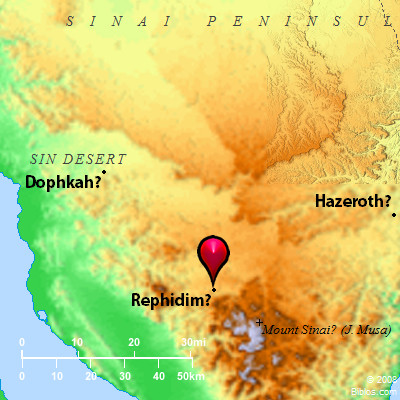Atlas  Meribah 2 (Rephidim) and surrounding area
Maps Created using Biblemapper 3.0Additional data from OpenBible.info
You are free to use up to 50 Biblos coprighted maps (small or large) for your website or presentation. Please credit Biblos.com. Occurrences Exodus 17:7 He called the name of the place Massah, and Meribah, because the children of Israel quarreled, and because they tested Yahweh, saying, "Is Yahweh among us, or not?" Deuteronomy 33:8 Of Levi he said, "Your Thummim and your Urim are with your godly one, whom you proved at Massah, with whom you strove at the waters of Meribah; Encyclopedia MASSAH AND MERIBAHmas'-a, mer'-i-ba (maccah umeribhah, "proving and strife"; peirasmos kai loidoresis): These names occur together as applied to one place only in Exodus 17:7; they stand, however, in parallelism in Deuteronomy 33:8 Psalm 95:8. In all other cases they are kept distinct, as belonging to two separate narratives. The conjunction here may be due to conflation of the sources. Of course, it is not impossible that, for the reason stated, the double name was given, although elsewhere (Deuteronomy 6:16; Deuteronomy 9:22) the place is referred to as Massah.
1. First Instance:
This scene is laid in Exodus 17:1 at REPHIDIM (which see) and in 17:6 at HOREB (which see). It is near the beginning of the desert wanderings. In dearth of water the people murmur and complain. Moses, appealing to God, is told what to do. He takes with him the elders of Israel, and smites with his rod the rock on which the Lord stands in Horeb, whereupon water gushes forth, and the people drink. Here Moses alone is God's agent. There is no hint of blame attaching to him. He called the place Massah and Meribah, because of the of the striving of the children of Israel, and because they tempted the Lord (17:7). In some way not indicated, here and at Meribah, God put the Levites to proof (Deuteronomy 33:8).
2. Second Instance:
The second narrative describes what took place at Kadesh (i.e. "Kadesh-barnea") when the desert wanderings were nearly over (Numbers 20:1-13). The flow of water from the famous spring for some reason had ceased. In their distress the people became impatient and petulant. At the door of the tent of meeting Moses and Aaron received the Lord's instructions. In his speech of remonstrance to the people Moses seemed to glorify himself and his brother; and instead of speaking to the rock as God had commanded, he struck it twice with his rod. The flow of water was at once restored; but Moses and Aaron were heavily punished because they did not sanctify God in the eyes of the children of Israel. The "Waters of Meribah" was the name given to this scene of strife. The incident is referred to in Numbers 20:24, and Deuteronomy 32:51 (merobhath qadhesh, the King James Version "Meribah-Kadesh," the Revised Version (British and American) "Meribah of Kadesh"). In Psalm 81:7 God appears as having tested Israel here. The sin of Israel and the ensuing calamity to Moses are alluded to in Psalm 106:32.
The place appears in Ezekiel 47:19; Ezekiel 48:28, as on the southern border of the land of Israel, in the former as "Meriboth-kadesh," in the latter as "Meribath-kadesh" (Meriboth = plural Meribath = "construct singular") where the position indicated is that of `Ain Qadis, "Kadesh-barnea."
In Deuteronomy 33:2, by a slight emendation of the text we might read meribhoth qadhesh for meribhebhoth qodhesh. This gives a preferable sense.
W. Ewing |
    |




